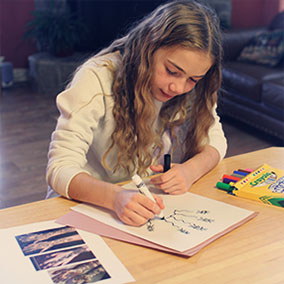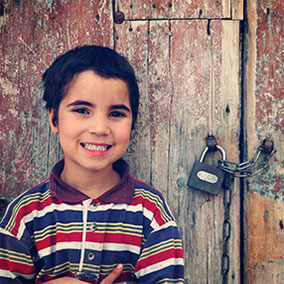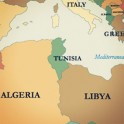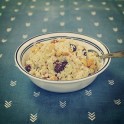Hi. I’m Kamel (kah-MEHL). Imagine sitting on a leather saddle, swaying atop a camel as you cross the largest desert in the world. Through the blurry haze and radiating heat, you spy thousands of green palm trees. No, it’s not a mirage. It’s Tozeur (TOH-zoor), a real oasis in the Sahara, and my hometown.
We supply the world with sweet dates that grow in clusters at the top of palm trees just like these. One variety of dates is called “fingers of light” because the sun’s rays seem to shine right through them. When harvesting ripe dates, some workers still climb to the treetops, but many rely on huge forklift trucks to carry them 65 feet above the ground. Under the palm tree canopy, fruit trees burst with bananas, oranges, lemons, pomegranates, and figs. All of these trees are watered by 200 natural springs that flow through pipelines designed back in the 1200s.
Let’s go through the medina (muh-DEE-nah), the old city. Arched passageways connect the narrow streets. Most buildings are made of yellow bricks. Look closely for geometric designs in the walls. Many of the homes’ wooden doors have more than one knocker. The lower one is for children to use. The outdoor markets in this neighborhood are famous for handmade baskets, ceramics, and rugs. If you get hot and thirsty, we can stop for Boga, a carbonated soft drink that comes in flavors like orange, lemon-lime, and mint.
That big building is the hammam (hah-MAHM), the public bathhouse my family has owned for 700 years. Before homes had plumbing, people bathed here. Today, townspeople and tourists come here to relax and enjoy the water’s healing properties. This hamman also has a sauna and a place to get a massage. After school, I work here with my father. I show men the locker room where they can change out of their clothes.
See that mosque with the high tower? Sometimes my family attends services there during Muslim holidays. Father says we should try to please our God, Allah, in this lifetime. In the future, Allah will consider our good and bad deeds and decide if we are worthy to enter heaven. But right now, I’m thinking about the present. Do you want to go for a camel ride?

Family Activity
Prep Time: 2 minutes
Activity Time: 10 minutes
Materials: 1 white or tan piece of construction paper, pencil, brown or colored pencil
Try a traditional form of body art used in Tunisia for special occasions. Make your own henna hand. Choose a piece of white or tan construction paper. Trace around your hand and wrist with a pencil. Make sure to spread your fingers apart so you can easily get your pencil between them. Parents can help young children with tracing. If you want your designs to look like a real henna stain, use a brown marker or colored pencil and make all your designs the same color. Otherwise, choose any colors you want. Make repeating designs on all five fingers, from the fingertip to the bottom. Make a large design on the palm area and a small repeating design along the wrist. You can search common henna patterns online or use your imagination to create your own!
Pray:
- Almost all Tunisian Arabs are Muslims. Pray that they will have the opportunity to hear about Jesus the Savior, the one who came to restore their relationship with a holy God.
- Pray for the small number of Christians to remain strong in their faith when they are pressured by relatives to return to the religion of Islam.
Tunisian Arabs
Farka
Breakfast Porridge
North Africa
Preparation Time: 30 minutes | Serves: 8
Ingredients
- 2 ⅔ cups of couscous
- 2 ⅔ cup of water
- ½ cup sugar
- ¼ cup vegetable oil
- 1½ cups mixed nuts, chopped (walnuts, almonds, hazelnuts, pistachios, pine nuts)
- 8 ounces of pitted dates
- 2 cups of milk
- additional sugar






